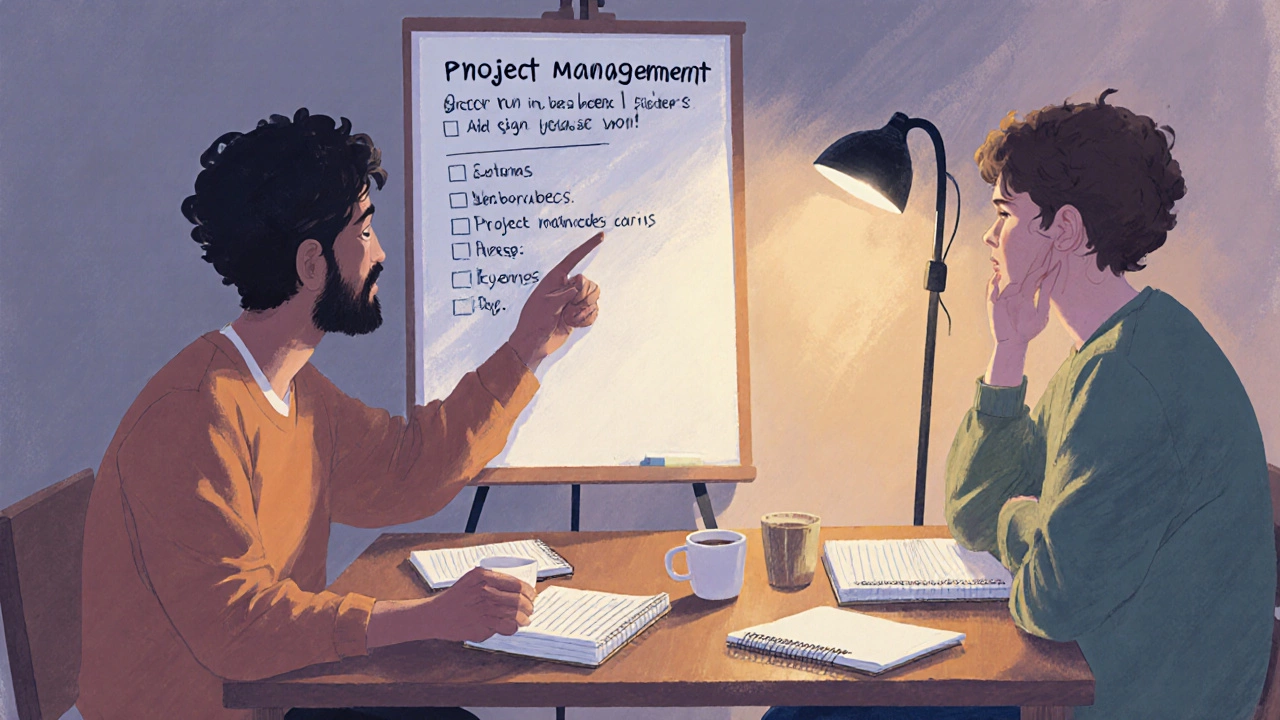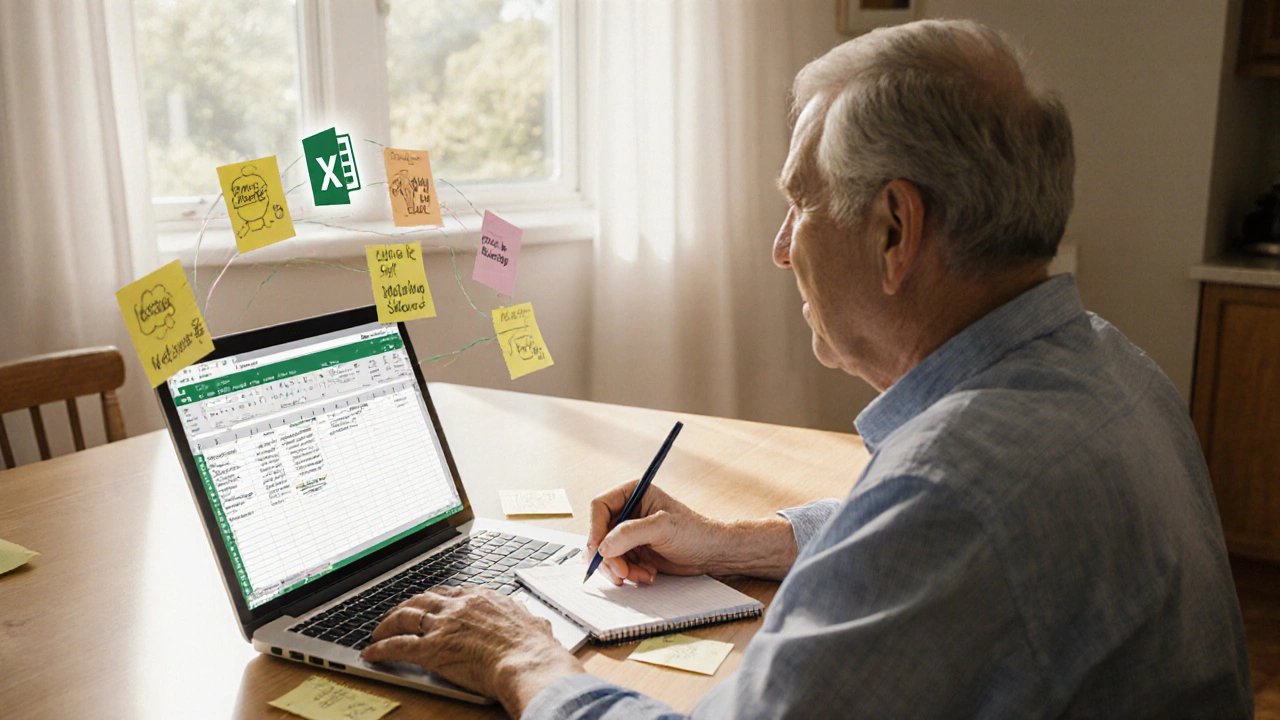Most adults don’t learn the way they did in school. That’s not a flaw-it’s biology. By the time you’re 25, your brain doesn’t absorb information the same way it did at 16. You’re not slow. You’re just wired differently. And if you’ve ever sat through a boring online course, stared at a textbook for an hour, and walked away remembering nothing, you know this isn’t about motivation. It’s about method.
Adults learn best when they can connect new info to what they already know
Your brain doesn’t store facts in isolation. It builds networks. When you’re learning something new-say, how to use Excel for budgeting-you don’t just memorize formulas. You link them to what you already understand: paying bills, tracking spending, saving for a vacation. That’s called prior knowledge, and it’s the single biggest predictor of adult learning success.
A 2023 study from the University of Melbourne tracked 400 adults taking free online courses in digital skills. Those who started by mapping what they already knew about the topic retained 68% more information after six weeks than those who jumped straight into the material. They didn’t just watch videos-they wrote down, “I already know how to sort data in Google Sheets, so this Excel pivot table thing is probably similar.” That small act of connection made all the difference.
Try this: Before you start any new learning task, ask yourself: “What’s something I already understand that’s like this?” Write it down. Even if it’s just, “This feels like fixing my car-trial and error until it works.” That’s your brain’s way of saying, “I’ve got a hook for this.”
Learning sticks when it’s useful right away
Adults aren’t students. We don’t have semesters. We don’t have grades. We have deadlines, jobs, kids, and tired brains. If you can’t use what you’re learning within 24 to 48 hours, your brain files it under “maybe later” and forgets it.
Take language learning. People who use apps like Duolingo and only practice in the app? Most quit within three months. People who use the same app but start speaking to a barista in Spanish, or label their fridge in French? They stick with it. Why? Because the learning has an immediate, real-world payoff.
That’s called immediate application. It’s not about being perfect. It’s about being practical. If you’re learning project management, don’t wait to get a promotion. Start managing your weekend grocery list like a project: assign tasks, set deadlines, track progress. If you’re learning basic accounting, open your last bank statement and categorize every transaction. Do it now. Not tomorrow. Not after the course ends.
Adults learn by doing-not by watching. And the sooner you do, the more it sticks.
Short, focused sessions beat long cramming marathons
Remember when you studied for exams by pulling all-nighters? That worked for teenagers with high caffeine tolerance and no responsibilities. It doesn’t work for adults with a full plate.
Neuroscience shows that adult brains retain information best in 20- to 30-minute bursts, followed by a 5- to 10-minute break. This isn’t a suggestion-it’s a biological limit. After 30 minutes, your prefrontal cortex (the part that handles focus and decision-making) starts to shut down. You’re not lazy. You’re just hitting a hard cap.
Here’s what works: 25 minutes of focused learning, 5 minutes of walking, stretching, or staring out the window. Repeat. Three sessions a day, 75 minutes total, beats five hours of distracted scrolling and half-reading.
Use a timer. No apps needed. Just set your phone. When the timer goes off, stop. Don’t push through. Get up. Drink water. Look at something far away. Your brain needs that reset. This isn’t a hack-it’s how your brain actually works.

Learning with others beats learning alone
Most adult learning platforms push isolation: watch, quiz, repeat. But humans aren’t designed to learn in silence. We learn through conversation, correction, and collaboration.
A 2024 meta-analysis of 87 adult education studies found that learners who joined peer discussion groups retained 73% more information after three months than those who studied solo. Why? Because explaining something to someone else forces your brain to organize the knowledge. And hearing someone else’s confusion helps you spot gaps in your own understanding.
You don’t need a formal class. Start a WhatsApp group with two other people learning the same thing. Meet once a week for 30 minutes. Ask: “What tripped you up this week?” “What clicked?” “Show me how you did it.” That’s all it takes. The group doesn’t have to be perfect. It just has to exist.
Even posting a question in a Facebook group or Reddit thread counts. The act of asking forces you to clarify your thinking. And someone else’s answer might be the missing piece you didn’t know you needed.
Feedback loops turn confusion into confidence
Adults hate being wrong. We’ve spent years being judged on performance. That makes us avoid situations where we might mess up.
But learning requires mistakes. The key isn’t avoiding them-it’s getting fast, clear feedback when you do.
Think about driving. You don’t learn by reading a manual. You learn by turning the wheel too much, correcting, hearing the tires screech, adjusting. That’s feedback. Real-time, sensory, immediate.
Apply that to learning. If you’re learning to code, run your script after every five lines. Don’t wait until the whole program is done. If you’re learning to write emails, send one draft to a trusted friend and ask: “Was this clear?” If you’re learning public speaking, record yourself and watch it back the same day.
Feedback doesn’t have to come from a teacher. It can come from a tool, a recording, or a friend. But without it, you’re just guessing-and guessing doesn’t lead to mastery.

Emotions drive retention more than logic
Here’s something counterintuitive: You don’t remember facts. You remember how you felt when you learned them.
If you learned how to balance a checkbook while stressed about rent, you’ll remember it because of the relief you felt when it finally added up. If you learned a new software tool during a team win, you’ll remember it because of the pride.
That’s emotional encoding. It’s why people remember their first kiss but forget the capital of Belarus.
So if you’re trying to learn something hard, tie it to a positive emotion. Celebrate small wins. Reward yourself after a session. Share your progress with someone who cheers you on. Make the process feel good. Not perfect. Just good.
Adults don’t learn because they have to. They learn because it feels worth it.
What doesn’t work (and why)
Let’s clear up some myths.
- “I’m a visual/auditory/kinesthetic learner.” That theory was popular in the 2000s. But a 2022 review of 12 large-scale studies found zero evidence that matching teaching style to a “learning style” improves outcomes. You’re not a “visual learner.” You’re a human who benefits from clear examples, practice, and feedback-no matter how they’re delivered.
- “More hours = better results.” No. Fatigue kills retention. Three focused hours beat eight distracted ones.
- “I need to master everything before moving on.” That’s how you get stuck. Learn the 20% that gives you 80% of the results. Then build from there.
Forget the hype. Stick to the science: connect it to what you know, use it fast, learn in short bursts, talk about it, get feedback, and make it feel good.
Start tomorrow-don’t wait for perfect
You don’t need a course. You don’t need a certificate. You don’t need more time.
You just need to pick one thing you want to learn. Then ask yourself:
- What’s something I already understand that’s like this?
- How can I use this in the next 24 hours?
- Can I do it in 25 minutes?
- Who can I talk to about it?
- How will I know if I got it right?
- What part of this makes me feel proud?
Answer those six questions. Then do it. Not tomorrow. Today.
Adult learning isn’t about being smart. It’s about being strategic. And you’re already smarter than you think.
Why do adults forget what they learn so quickly?
Adults forget quickly when learning is passive, disconnected from real life, or spread out over too long a time. The brain prioritizes information that’s used, repeated, or tied to emotion. If you’re just watching videos or reading without applying it, your brain doesn’t see it as important. The fix? Use what you learn within 24 hours, even in a small way-like writing a practice email or trying a new formula in your budget spreadsheet.
Is it too late to learn something new as an adult?
No. Neuroplasticity-the brain’s ability to form new connections-doesn’t shut down after age 25. It just changes. Adults learn differently, not worse. You might take longer to memorize facts, but you’re better at understanding context, spotting patterns, and applying knowledge to real problems. That’s why many adults outperform younger learners in complex tasks like problem-solving or decision-making.
What’s the best time of day to learn as an adult?
There’s no universal “best” time. But most adults learn best when they’re least tired-often in the morning after a good night’s sleep or in the early evening after a break. Avoid learning right after a heavy meal or during your usual commute. The key isn’t the clock-it’s your energy level. Pick a time when your focus feels sharp, not when you’re just trying to check a box.
Can I learn effectively without spending money?
Absolutely. Free resources like YouTube tutorials, public library courses, Reddit communities, and open educational platforms (like Khan Academy or MIT OpenCourseWare) offer high-quality content. What you pay for isn’t the material-it’s structure, feedback, and accountability. You can replicate those for free by joining a study group, asking for feedback from a friend, or setting your own deadlines.
How do I stay motivated when learning feels slow?
Motivation doesn’t come from willpower-it comes from small wins. Track progress in a notebook: “Today I figured out how to pivot a table.” “I explained this to my partner and they understood.” Celebrate those. Don’t wait for mastery. Adult learning is a series of tiny breakthroughs, not one big moment. If you feel stuck, go back to the last thing you got right and build from there.
Adult learning isn’t about catching up. It’s about moving forward-on your terms, at your pace, with your life as the foundation. You’ve already learned so much. Now it’s time to learn again, the way your brain actually wants to.

